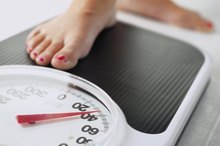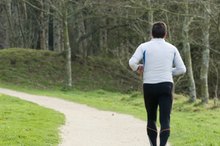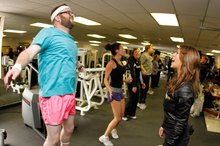How Long Should I Run a Day if I Need to Lose 10 Pounds?
If you want to lose weight, running is one of the best ways to do it, as running burns more calories than any other form of cardio exercise. If your goal is to lose 10 pounds, the amount of running you need to do depends on your current weight and the speed at which you run. You can determine the right amount of running to meet your weight-loss goals with some caloric calculations.
Weight-Loss Basics
The formula for losing weight is burning more calories than you consume each day. A pound is equivalent to about 3,500 calories, so if you burn an extra 500 calories in a day, you will lose one pound in a week. The Centers for Disease Control and Prevention recommends losing one to two pounds per week for a healthy, sustainable rate of weight loss. If you lose weight more quickly, you will be more likely to gain it back and may also be in danger of nutritional deficiencies.
- The formula for losing weight is burning more calories than you consume each day.
Running and Calories
How to Lose 15 Pounds in One Month
Learn More
Running can help you burn calories each day to help you lose 10 pounds. Set weekly milestones to break down your 10-pound weight-loss goal by aiming to lose one or two pounds per week. The amount of calories you burn each week will depend on your running plan. In general, the more you weigh, the more calories you will burn running. A 200-pound person who runs for 30 minutes at 6 miles per hour, for instance, burns about 456 calories, whereas a 150-pound person burns 342 calories doing the same run. You can get an estimate of how many calories you burn running by using HealthStatus.com's calories-burned calculator (see Resources).
- Running can help you burn calories each day to help you lose 10 pounds.
- Set weekly milestones to break down your 10-pound weight-loss goal by aiming to lose one or two pounds per week.
Running Speed
The higher your intensity while running, the more calories you will burn. So, if you run faster, you will burn more calories. A 150-pound person who runs for 30 minutes at 6 miles per hour pace burns about 342 calories, but if she steps up her pace to run at 8 miles per hour, she will burn about 458 calories. You can adjust your pace to meet your daily calorie-burning goals. If you run fast one day, allow yourself an easier, slower pace the next day to recover.
- The higher your intensity while running, the more calories you will burn.
- So, if you run faster, you will burn more calories.
Running Duration
How to Run Using Jeff Galloway's Run/Walk/Run Training Method
Learn More
In addition to your weight and running speed, your calorie burning will be determined by how long you run. The longer you run, the more calories you will burn. You may want to consider doing one long run a week to burn extra calories, or extend your daily runs by an extra half mile or mile to speed up your weight loss. Be careful not to overwork yourself, however, and allow yourself one day of rest or cross-training a week so your body can recover from running.
- In addition to your weight and running speed, your calorie burning will be determined by how long you run.
- Be careful not to overwork yourself, however, and allow yourself one day of rest or cross-training a week so your body can recover from running.
Related Articles
References
- U.S. News: Want to Lose Weight? Then Run, Don't Walk: Study
- Centers for Disease Control and Prevention: Losing Weight
- Calorie Burners: Activities that turn up the heat. American Council on Exercise
- Li SSW, Chan OHT, Ng TY, et al. Gender Differences in Energy Expenditure During Walking With Backpack and Double-Pack Loads. Hum Factors. 2018;:18720818799190. doi:10.1177/0018720818799190
- Chang CH, Lin KC, Ho CS, Huang CC. Accuracy of the energy expenditure during uphill exercise measured by the Waist-worn ActiGraph. J Exerc Sci Fit. 2019;17(2):62-66. doi:10.1016/j.jesf.2019.01.003
- Champagne CM, Broyles ST, Moran LD, et al. Dietary intakes associated with successful weight loss and maintenance during the Weight Loss Maintenance trial. J Am Diet Assoc. 2011;111(12):1826-35. doi:10.1016/j.jada.2011.09.014
- LAYDEN, J. D., PATTERSON, M. J., & NIMMO, M. A. (2002). Effects of reduced ambient temperature on fat utilization during submaximal exercise. Medicine & Science in Sports & Exercise, 34(5), 774–779. doi:10.1097/00005768-200205000-00008
- Li, S. S. W., Chan, O. H. T., Ng, T. Y., Kam, L. H., Ng, C. Y., Chung, W. C., & Chow, D. H. K. (2018). Gender Differences in Energy Expenditure During Walking With Backpack and Double-Pack Loads. Human Factors: The Journal of the Human Factors and Ergonomics Society, 61(2), 203–213. doi:10.1177/0018720818799190
- Michael N. Sawka,1 C. Bruce Wenger, Andrew J. Young, and Kent B. Pandolf. Physiological Responses to Exercise in the Heat. Copyright 1993 by the National Academy of Sciences. All rights reserved.
- Morio, B., Beaufrere, B., Montaurier, C., Verdier, E., Ritz, P., Fellmann, N., … Vermorel, M. (1997). Gender differences in energy expended during activities and in daily energy expenditure of elderly people. American Journal of Physiology-Endocrinology and Metabolism, 273(2), E321–E327. doi:10.1152/ajpendo.1997.273.2.e321
- Yue, A. S. Y., Woo, J., Ip, K. W. M., Sum, C. M. W., Kwok, T., & Hui, S. S. C. (2007). Effect of age and gender on energy expenditure in common activities of daily living in a Chinese population. Disability and Rehabilitation, 29(2), 91–96. doi:10.1080/09638280600662232
- Ainsworth, B.; Haskell, W.; Herrmann, S. et al. Compendium of Physical Activities: A Second Update of Codes and MET Values. Med Sci Sports Exercise. 2011;43:1575. DOI: 10.1249/MSS.0b013e31821ece12.
- American Council on Exercise. (2009) Fit Facts - Calories Burners: Activities That Turn Up the Heat. San Diego, California: American Council on Exercise.
Resources
Writer Bio
Marnie Kunz has been an award-winning writer covering fitness, pets, lifestyle, entertainment and health since 2003. Her articles have been published in "The Atlanta Journal-Constitution," "Alive," "The Marietta Daily Journal" and other publications. Kunz holds a Bachelor of Arts in creative writing from Knox College and is a Road Runners Club of America-certified running coach and a certified pole dance instructor.








